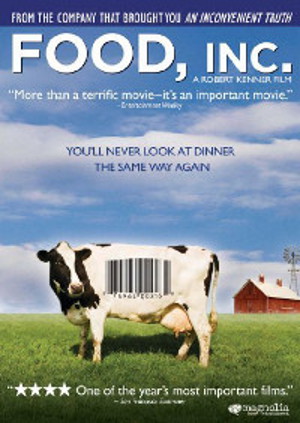
Food, Inc. is a 2008 documentary directed by Emmy Award-winning Robert Kenner.
Food, Inc. examines corporate farming in the United States and concludes that agribusiness produces food that is unhealthy. At the same time agribusiness harms the environment and abuses both animals and employees. The film is narrated by Michael Pollan and Eric Schlosser.
Storyline
Current methods of raw food production are a response to growth of the fast food industry since the 1950s. Food production has more drastically changed since that time than in all of the several thousand years prior.
Controlled primarily by a handful of multinational corporations, the global food production business – with an emphasis business – has as its unwritten goals production of large quantities of food at low direct inputs (most often subsidized with taxpayer dollars) resulting in enormous profits. This results in greater control of the global supply of food sources.
Health and safety (of the food, of the animals, of the workers on the assembly lines, and of the consumers actually eating the food) are overlooked by the companies, and by government in an effort to provide cheap food regardless of negative consequences.
One reviewer said,
The message of ‘ Food, Inc.’ is that the ugly facts of animal mistreatment, food contamination, and government collusion are covered up by a secretive industry that wouldn’t talk to the filmmakers or let the interiors of their chicken farms, cattle ranches, slaughterhouses, and meatpacking plants be filmed.
As an exposé the film offers hope that things can be made better through grassroots efforts.
Monsanto, Smithfield, Perdue, et al. are rich and powerful. But so were the tobacco companies, and if they could be fought successfully, so can the food industry.
The fact that Walmart in its vastness is switching to organic foods because customers want them shows people vote effectively when they buy.
As Food, Inc. mentions, exploitation and malpractice in the meat industry were exposed as far back as Upton Sinclair’s 1906 muckraking book, ‘The Jungle.’ After that improvements were made till meat packing became a good and well paid job. Think of the NFL Packers, from Green Bay, Wisconsin.
Food, Inc. is a populist and practical film that speaks with the voices of farmers, advocates, and journalists. It focuses on food, what’s wrong with it, and what we can do about it.
Food, Inc. explains that a handful of companies control most of the beef, pork, chicken, and corn produced in the US as well as most other food products.
Because of the way certain food products have taxpayer dollars support, hamburgers are cheaper than fresh vegetables.
Chickens have been developed to grow bigger faster with more breast meat. They’re kept in closed dark buildings. They can’t walk for more than a few steps. They are filled with antibiotics, deformed, suffering, ankle deep in their own excrement, brutally killed.
The film has good footage of the big southern meat producer, Smithfield, showing how the mega-food industry feeds off exploited low-wage illegal immigrants who it treats as expendable, just like the animals.
An important spokesman in ‘Food, Inc.‘ is an organic farmer (you could just say a stubbornly old-fashioned one) called Joel Salatin of Polyface Farm in Swoope, Virginia. His cattle are grass-fed and watching them, we realize that’s the way nature meant them to be. They roams free, living a healthy life, trimming back the grass while fertilizing it so it will grow back. Cattle weren’t meant to live on corn, and doing so has led to infection. The industry solution to such problems is not to change back to earlier methods, but to add more chemicals. They’re doing crazy things like adding bleach to hamburger filler to keep the burgers from being poison…
Instant Streaming with Amazon Prime ~ Food Inc.
Also watch ~ Forks Over Knives
